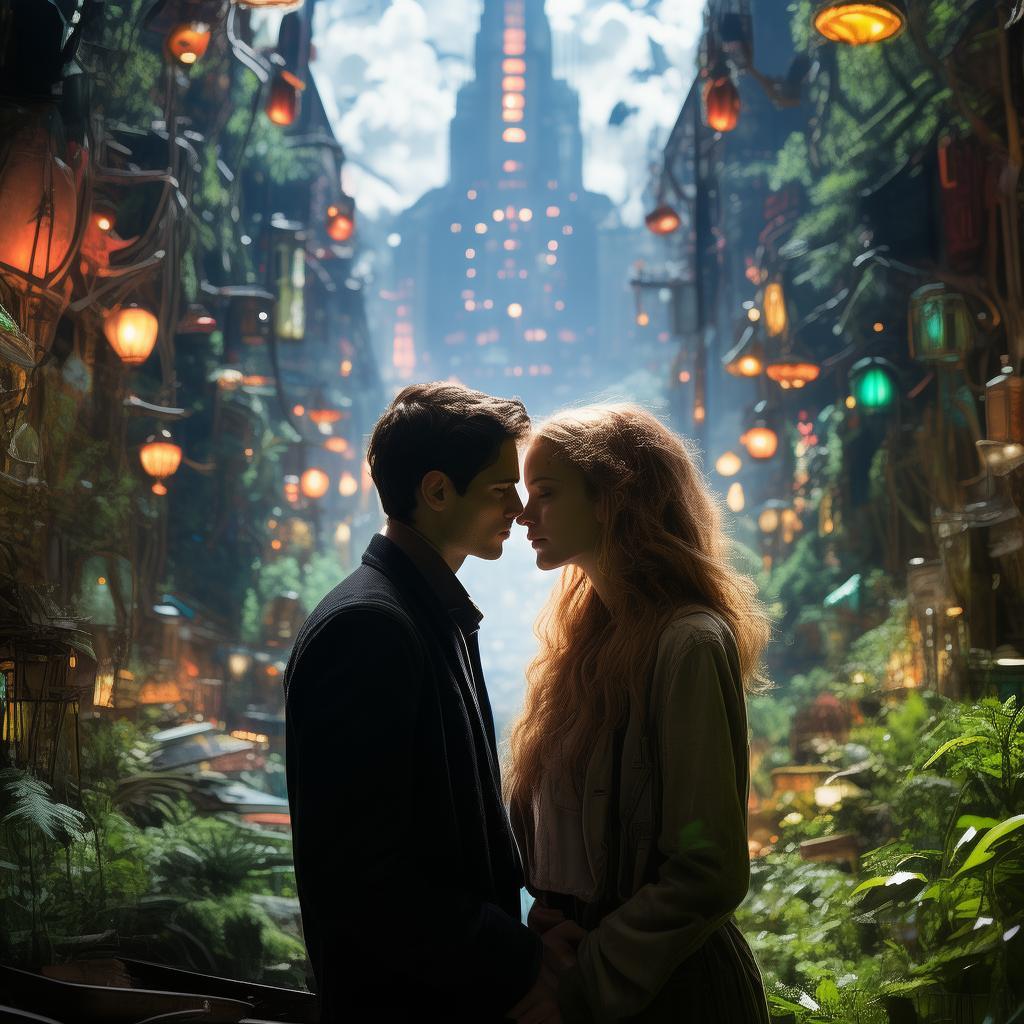Whispers of the Symphony: A Love's Harmonious Rhapsody
The Beijing Symphony was a place of grandeur, where the notes of a symphony could fill the air with emotion and the echo of a single string could resonate through the hearts of all. Wu Mei, a prodigious violinist, had grown up within its walls, her fingers dancing upon the strings with a mastery that was both awe-inspiring and enigmatic. Her life was a melody of precision and passion, but as she stood before the grand hall, her heart played a different tune—one of longing and dissonance.
The story began on a crisp autumn evening, as Wu Mei, adorned in her custom-tailored suit, walked through the grand marble doors of the symphony hall. Her eyes were fixed on the stage, where the Beijing Symphony was about to perform its most anticipated piece: "Love's Harmonious Rhapsody," composed by none other than her late father, a maestro whose legacy was as vast as the music he created.
The first notes of the rhapsody filled the hall, and Wu Mei's heart swelled with pride and sorrow. Her father had been her inspiration, her mentor, and her confidant, but he had left her a puzzle: a love story interwoven into the fabric of the symphony itself. Each movement was a chapter of a story she had never heard, and she was determined to uncover its secrets.
As the symphony played, Wu Mei's mind wandered to the man who had become the silent protagonist of her father's final work. He was a mystery, a figure whose existence was as enigmatic as the music that was to be revealed. Who was he? What was his role in this love story?

The second movement of the rhapsody brought with it a sense of longing, and Wu Mei found herself fixated on the third violinist, a man who seemed to be lost in his own world, his eyes often wandering to the edge of the stage where Wu Mei stood. It was as if he were searching for something—or someone—there. Could this man be the one her father had written about?
The third movement was a tempest of passion and conflict, the music a metaphor for the turmoil in the protagonist's heart. Wu Mei's own emotions were in turmoil as she watched the violinist, whose every movement seemed to mirror the intensity of the music. He was beautiful, passionate, and enigmatic, a man who seemed to be as out of reach as the music itself.
It was after the performance that Wu Mei finally mustered the courage to approach the violinist, who introduced himself as Li. They exchanged brief pleasantries, but Wu Mei couldn't shake the feeling that there was more to Li than met the eye. The connection between them was palpable, a silent understanding that seemed to transcend the music.
Days turned into weeks, and Wu Mei and Li found themselves drawn together by their shared love of music and an inexplicable connection. They spoke of dreams, of passion, of the symphony, and as their conversations grew deeper, Wu Mei realized that Li was the missing piece of her father's rhapsody. He was the man her father had written about, a man whose love was as complex and beautiful as the music itself.
But as Wu Mei delved deeper into the story, she discovered that Li's life was shrouded in mystery. His past was a labyrinth of secrets and lies, and as they unraveled the layers of his existence, Wu Mei found herself entangled in a web of danger and deceit.
The climax of the story occurred when Wu Mei uncovered the truth about Li's past. It was a revelation that would change everything, a truth that could shatter the symphony of their love. Li was a spy, a man who had been sent to protect her, to ensure that the symphony continued to play, but at what cost?
As the music reached its final crescendo, Wu Mei stood before Li, her heart pounding with a mixture of fear and love. The symphony played, a testament to their love, but the fate of their relationship hung in the balance. Would Wu Mei choose love, or would she allow the music to dictate her fate?
In the end, Wu Mei made a decision that would resonate with the audience long after the final note had faded. She chose love, and in doing so, she brought harmony to the symphony of her heart. The Beijing Symphony continued to play, a testament to the power of love and the beauty of music, even in the face of adversity.
The ending of Wu Mei's story was bittersweet, a reminder that love is often a complex melody, filled with dissonance and harmony. Yet, in the end, it is the harmony that prevails, and Wu Mei's love, like the music of the Beijing Symphony, became a rhapsody that would be remembered for generations to come.
✨ Original Statement ✨
All articles published on this website (including but not limited to text, images, videos, and other content) are original or authorized for reposting and are protected by relevant laws. Without the explicit written permission of this website, no individual or organization may copy, modify, repost, or use the content for commercial purposes.
If you need to quote or cooperate, please contact this site for authorization. We reserve the right to pursue legal responsibility for any unauthorized use.
Hereby declared.








